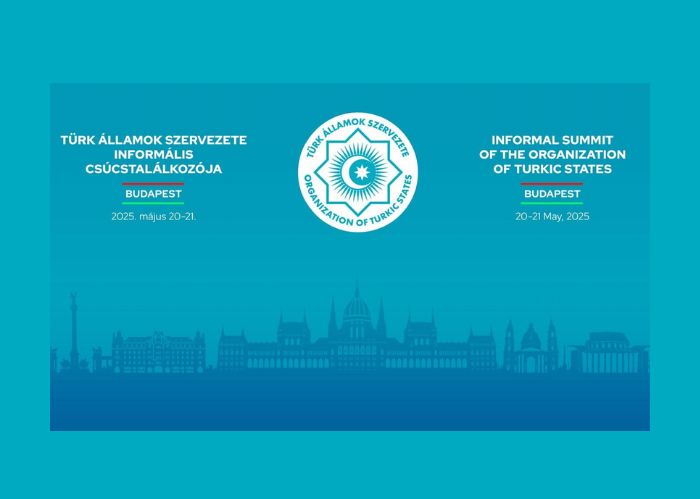BAKU, Azerbaijan, May 20. On May 20-21, 2025, Hungary will host an informal summit of the Organization of Turkic States (OTS) - a milestone event that signals not only the growing geographic reach of the organization but also a qualitative shift in its activity. This will be the first time an OTS summit is held in an observer state, highlighting Budapest's increasing engagement with developments within the Turkic world. The summit's motto, "Meeting point of East and West", aptly reflects the organization’s ambition to serve as a bridge between the two regions. In this evolving dynamic, Azerbaijan continues to play a central role.
Since the OTS was established, Azerbaijan has been one of its key members, consistently championing the cause of Turkic integration. Its efforts to boost economic cooperation among member states have been particularly significant. In 2024 alone, Azerbaijan’s trade turnover with OTS countries reached $6.893 billion - accounting for 14.5% of the nation’s total foreign trade. Notable growth was seen in trade with Kazakhstan (up 49.8%) and Uzbekistan (up 41%), underscoring the deepening mutual interest in strengthening business ties.
Beyond trade, Azerbaijan is actively involved in building shared economic institutions. A prime example is the Turkic Investment Fund, which began operations in 2024. Each of the five member countries - Azerbaijan, Türkiye, Kazakhstan, Kyrgyzstan, and Uzbekistan - contributed $100 million. Soon after its launch, a decision was made to increase the fund’s capital to $600 million.
Azerbaijan also plays a pivotal role in one of the OTS’s most ambitious initiatives - the East-West transport corridor, widely known as the Middle Corridor. In 2024, cargo volume along this route rose by 62%, reaching 4.5 million tons. An additional 2.5 million tons is planned for 2025, with throughput capacity projected to reach 10 million tons by 2027.
To support this vision, Azerbaijan is investing heavily in infrastructure. The Baku-Tbilisi-Kars railway’s capacity has grown from 1 to 5 million tons. New vessels are under construction at the Baku Shipyard, expanding the Caspian commercial fleet to over 50 vessels. The Alat Port is being upgraded to increase its capacity from 15 to 25 million tons, and by 2026, the country’s ninth international airport will open in Lachin. These developments strengthen the logistics backbone of Turkic cooperation and position Azerbaijan as a strategic regional transit hub.
A new priority area is cooperation in green energy. In November 2024, during COP29 in Baku, Azerbaijan, Kazakhstan, and Uzbekistan signed a Strategic Partnership Agreement on renewable energy production and transmission. This initiative lays the groundwork for sustainable energy corridors to Europe. As the EU accelerates its energy transition and reduces reliance on traditional sources, this "green alliance" of three OTS members is becoming increasingly vital. The project aims to integrate national energy systems and facilitate the export of clean electricity to global markets.
Alongside transport and energy, Azerbaijan is taking an active role in the digital transformation of the Turkic space. A Digital Economy Agreement signed in 2024 aims to promote e-commerce, fintech, digital payments, and cybersecurity. These efforts are closely linked to the Trade Facilitation Strategy, which includes implementing e-invoicing and a single-window system for streamlining cross-border transactions.
Another important step toward financial integration is the planned creation of a Council of Central Banks of OTS member states. This body will coordinate macroeconomic policy and enhance the resilience of national financial systems. Such initiatives open the door to deeper financial interdependence and monetary stability within the bloc.
Turkic solidarity is also evident in the humanitarian sphere. Uzbekistan and Kazakhstan have built schools in Azerbaijan’s Fuzuli district. Kyrgyzstan has constructed a school in the village of Khydyrly in the Aghdam district, while Hungary is helping to rebuild the village of Soltanli in the Jabrayil district. These projects are not only important for infrastructure but also stand as symbols of unity and mutual support.
The OTS began as a cultural platform, but it is now evolving into a full-fledged geopolitical entity. Its political weight is growing, as is interest from external partners. Holding a summit in Hungary - an observer state - illustrates the organization’s intent to expand beyond its traditional geographic boundaries and become a force for balance between East and West.
Azerbaijan is a driving force in this process. Thanks to its strategic location, economic capabilities, and proactive diplomacy, it serves as a connector between Central Asia, the Caucasus, Türkiye, and Europe. Amid global uncertainty and rising competition among geo-economic blocs, the OTS is increasingly seen as a platform for sustainable development and mutual resilience.
Through major infrastructure projects, energy alliances, and digital initiatives, the OTS is strengthening ties among its members and creating new engines of regional growth. Azerbaijan - as one of the organization’s founding members and leaders - continues to play a vital role. Its strategy of connecting, investing, and guiding makes it not just a participant but a cornerstone of the entire system. The Budapest summit is likely to reinforce this trajectory and mark a new chapter in the evolution of the Turkic world - from a shared cultural heritage to a shared strategic future.







